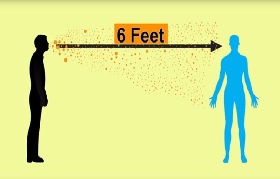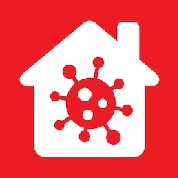VTU E-Content for Students & Faculty
When we appreciate all to stay home and stay safe, we encourage students and faculty to take up courses related to various domains of Engineering and MBA online.
Click here to view the link for various E-Learning Courses
Coronavirus - Social Distancing and Self-Quarantine
Now that the new coronavirus and COVID-19, the illness it causes, are spreading among communities in the United States and other countries, phrases such as “social distancing,” “self-quarantine” and “flattening the curve” are showing up in the media.
What do they mean, and how might they apply to you, your family and your community?
Lisa Maragakis, M.D., M.P.H., Senior Director of infection prevention at Johns Hopkins, helps clarify these concepts so you can understand better why they’re being recommended.
What is social distancing?

While it may be disappointing to hear that so many sports events, cruises, festivals and other gatherings are being cancelled, there is a public health reason for these measures. These cancellations help stop or slow down the spread of disease allowing the health care system to more readily care for patients over time.
Cancelling events that are likely to draw crowds is an example of social distancing. Social distancing is deliberately increasing the physical space between people to avoid spreading illness.
Other examples of social distancing that allow you to avoid larger crowds or crowded spaces are:
• Working from home instead of at the office
• Closing schools or switching to online classes
• Visiting loved ones by electronic devices instead of in person
• Cancelling or postponing conferences and large meetings
What is self-quarantine?

People who have been exposed to the new coronavirus and who are at risk for coming down with COVID-19 might practice self-quarantine. Health experts recommend that self-quarantine lasts 14 days. Two weeks provides enough time for them to know whether or not they will become ill and be contagious to other people.
You might be asked to practice self-quarantine if you have recently returned from traveling to a part of the country or the world where COVID-19 is spreading rapidly, or if you have knowingly been exposed to an infected person.
Self-quarantine involves:
• Using standard hygiene and washing hands frequently
• Not sharing things like towels and utensils
• Staying at home
• Not having visitors
• Staying at least 6 feet away from other people in your household
Once your quarantine period has ended, if you do not have symptoms, follow your doctor’s instructions on how to return to your normal routine.
What is isolation?
For people who are confirmed to have COVID-19, isolation is appropriate. Isolation is a health care term that means keeping people who are infected with a contagious illness away from those who are not infected. Isolation can take place at home or at a hospital or care facility. Special personal protective equipment will be used to care for these patients in health care settings.
Lessening Coronavirus Impact
It’s important to know what to do if you feel sick. The coronavirus pandemic is making everyone aware of handwashing and protecting others from coughs and sneezes. Along with those essential steps, practices such as social distancing, and self-quarantine and isolation when appropriate can slow the rate of infection in a city, town or community.
The pandemic can seem overwhelming, but in truth, every person can help slow down the spread of COVID-19. By doing your part, you can make a big difference to your health, and that of others around you.
Source: John Hopkins Medicine
Quote for the day
“No one is perfect - that’s why pencils have erasers.”
-Wolfgang Riebe